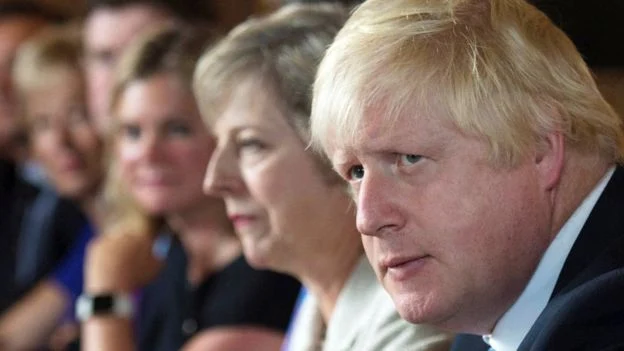Talks to restore power-sharing in
Northern Ireland are set to resume amid uncertainty about an anticipated
DUP-Conservative parliamentary deal.
Talks aimed at restoring the executive were previously put on hold due to the UK general election.
The deadline for an agreement to be reached has been extended to 29 June.
Speaking
ahead of the talks, Sinn Féin President Gerry Adams said no deal
between the Conservatives and the DUP would be good for Northern
Ireland.
Devolved government in Northern Ireland broke down in Janu
- Further discussions over DUP-Tory deal
- New Stormont talks deadline - 29 June
- Parties' red lines in Stormont talks
ary and there has been political deadlock following a snap assembly election in March.
Stormont leaders are expected to meet Secretary of State James
Brokenshire and the Irish minister for foreign affairs later on Monday.
If no executive is formed, Mr Brokenshire has warned Northern Ireland may face direct rule.
The secretary of state said he would continue to chair the talks, despite calls for an "independent broker".
"The
point is that we have a process already, which involves, yes the UK
government, but the Irish government too and also the head of the
Northern Ireland Civil Service," he said.
"That is something that was working to bring the parties together, I think that remains absolutely the way to approach this."
He said if there was no agreement by 29 June, Northern Ireland could face direct rule.
Mr
Adams said Sinn Féin did not believe that "any deal between the DUP
here and the English Tories will be good for the people here".
"Any
deal that undercuts, in any way, the process here or the Good Friday
Agreement and other agreements is one that has to be opposed by
progressives, and that puts a huge onus on the taoiseach, and there's an
incoming taoiseach [Leo Varadkar]," he said.
"I think [outgoing]
Taoiseach [Enda] Kenny was right when he expressed concerns about this
deal directly with the British prime minister."
Earlier, Sinn Féin's Conor Murphy said it "would be kind to describe Mr Brokenshire as delusional".
"His
government won't exist unless the DUP allow it to exist and the fact
that they will be dependent on them conflicts him even more."
Leo Varadkar,
the new leader of Ireland's Fine Gael party, has said he will raise
with Theresa May the importance of impartiality in the Stormont talks.
He
said it was important that the two governments, as co-guarantors of the
Good Friday Agreement, should not be too close to either unionism, or
nationalists and republicans.
Mr Varadkar is expected to become Irish prime minister later this week in a parliamentary vote on Enda Kenny's successor.
Analysis - Enda McClafferty, BBC News NI Political Correspondent
All
the parties will be back at Stormont today, but it is likely that the
focus will be on political partnerships in London and not Belfast.
The DUP is up for supporting a Conservative Government but only if its demands are met.
That support will involve backing Theresa May in any confidence vote and supporting her government's budgets.
As
yet there are no details on what the DUP wants in return but it is
thought its demands will include extra cash for Northern Ireland.
But some say the real cost of a deal could be the future of power-sharing in Northern Ireland.
Sinn
Féin, the SDLP and Alliance say any partnership between the DUP and
Conservatives could scupper plans to restore the institutions.
It is fast becoming a game of political poker with high stakes.
The
Irish Minister for Foreign Affairs, Charlie Flanagan, said he was
"looking forward to the talks process getting under way again".
"It
is now more important than ever that we have effective devolved
government in Northern Ireland, especially with Brexit negotiations due
to begin shortly," he said.
"It is absolutely crucial that the
voice of Northern Ireland should be heard in these negotiations through a
newly-formed power sharing executive."
Meanwhile, DUP leader Arlene Foster is due to meet the prime minister on Tuesday to discuss the formation of a DUP-supported Conservative government at Westminster.
The SDLP and Alliance Party have echoed Sinn Féin's concerns that such a partnership could make power-sharing at Stormont more difficult.
The
former Labour secretary of state for Northern Ireland, Peter Hain, told
BBC Radio Ulster's Good Morning Ulster a DUP-Conservative arrangement
could have a negative impact on the talks.
"My concern is that it
jeopardises the neutrality, the non-partisan stance, that a prime
minister and a secretary of state must have in relation to Northern
Ireland's politics," he said.
"If I, as secretary of state, or for
that matter Tony Blair, were seen to be aligned with any one party in
Northern Ireland, it would have compromised the trust we needed to build
with any other party."
Under Northern Ireland's power-sharing
agreement, the executive must be jointly run by unionists and
nationalists, with the largest party putting forward a candidate for
first minister.
Sinn Féin's Martin McGuinness quit as deputy first
minister in January in protest against the DUP's handling of a botched
green energy scheme.
The party said it would not share power with
DUP leader Arlene Foster as first minister until the conclusion of a
public inquiry into the Renewable Heat Incentive (RHI) scheme.
Mr McGuinness, who had been suffering from a rare heart condition, died earlier this year.
BBC NEWS





















